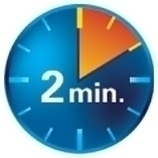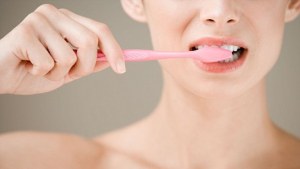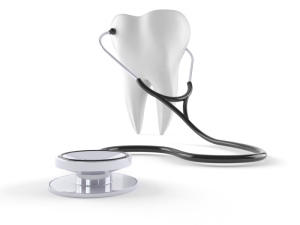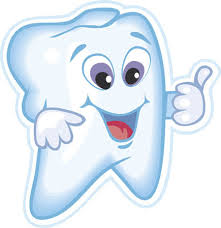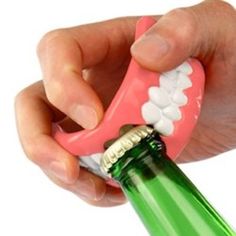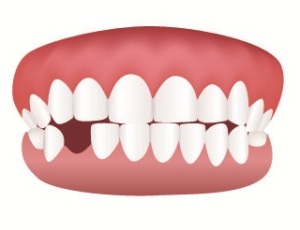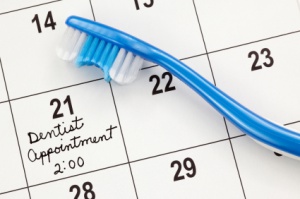Brush for at least two minutes. Set a timer if you have to, but don’t skimp on brushing time. Two minutes is the minimum time you need to clean all of your teeth. Many people brush for the length of a song on the radio. That acts as a good reminder to brush each tooth thoroughly.
Three common health problems tied to oral health (via @NewsMedical)
29 DecMany people think that going to the dentist is all about getting a bright and shining smile. While this is an important aspect of dentistry, an experienced dentist like Farzad Feiz, DDS, of Calabasas Dental Group and California Dental Care can also help patients with their overall health. According to Dr. Feiz, common dental problems like gum disease and jaw pain can point to a number of serious health issues whose diagnosis can be aided by regular visits to the dentist. Here are three common health problems that have proven ties to the health of your mouth.
- Diabetes –Periodontal disease, commonly known as gum disease, has been proven to negatively affect diabetes, and vice versa. Pamela McClain, the president of the American Academy of Periodontology, says that gum disease “further complicates diabetes because the inflammation impairs the body’s ability to utilize insulin”. It is especially important for anyone suffering from diabetes to make sure that they do everything that their dentist recommends to fend off gum disease. Additionally, an experienced West Los Angeles dentist like Dr. Feiz can identify regular recurrences of periodontal disease as a possible sign that a patient may have diabetes, due to the fact that patients suffering from diabetes get all kinds of infections much easier than someone without the disease.
- Osteoporosis – Osteoporosis is the thinning or weakening of bones that generally occurs in female patients, but can also occur in men. While many women and men often attribute the first symptoms of osteoporosis to general aches and pains caused by aging, the weakening of teeth noticed by a dentist can help detect the disease. A good dentist like Dr. Feiz will ask if women are experiencing any other joint and bone pain if he or she notices that the patient is losing teeth at a peculiar rate.
- Heart Disease – Patients with heart disease are much more likely to have gum disease than those without. Additionally, even if someone is already aware of their heart disease, working with their dentist to eliminate periodontal disease is extremely important in reducing the risk of heart attack or stroke. Because gum inflammation can lead to clogged arteries, people with periodontal disease are three times more likely to have a stroke and twice as likely to have a heart attack.
Source: http://www.news-medical.net/news/20141227/Three-common-health-problems-tied-to-oral-health.aspx
Oral Health and the Child With Cerebral Palsy (via @Medscape)
27 DecStudy Summary
Oral healthcare providers are entrusted with providing oral care to all members of the population, and advanced training may be required to administer care to specific groups, including those with special needs. Cerebral palsy (CP) represents a group of neurologic disorders attributed to nonprogressive disturbances in the fetal or infant brain, resulting in severe physical disability.[1] In addition to having posture and movement disorders, individuals with CP frequently experience disturbances of sensation, perception, cognition, and communication.[1]
Individuals with CP are reported to have a wide range of orofacial health problems owing to structural changes and neuromuscular deficits in these anatomical regions.[2] These may include dental and facial trauma, developmental enamel defects, erosive tooth wear, dental caries, and periodontal diseases.[1-3]
Oral health behaviors, such as oral hygiene practices and utilization of dental services, influence development of common oral diseases, and identification of these behaviors is important for disease prevention. Du and colleagues described and compared oral health behavioral practices of preschool children with and without CP to assess the oral health knowledge and oral health attitudes of their primary caregivers (PCGs). Preschool children with CP were identified from a complete list of special childcare centers in the Hong Kong Special Administrative Region (HKSAR), China. Ninety-four children with CP were identified and their PCGs were invited to participate in the study, but only 72 consented to participate. An age- and gender-matched control group of children from mainstream preschools in the geographical areas was recruited.
Structured questionnaires were used for data collection to assess oral health behaviors, oral health knowledge, and oral health attitudes. To assess oral health behaviors, the focus of the assessment was on dental attendance, oral hygiene practices, and snacking habits. To assess PCG’s oral health knowledge, questions focused on such areas as causes of dental caries, ways to prevent dental caries, causes of periodontal diseases, and ways to prevent periodontal diseases. Possible scores ranged from 0 to 3 for each of the four questions, with a maximum score of 12. Oral health attitudes of the PCGs were assessed using an eight-item scale, with statements reflecting general concepts about dental health and appearance related to missing and/or false teeth. This score ranged from 0 to 8, with a higher score representing a more positive attitude.
The major findings of the study were:
- The mean age of the children was 56 months (range, 30-77 months) and 54% were boys.
- Only 23.6% of children with CP ever attended a dentist compared with 40% in the control group. Dental attendance for children both in the case and control groups was predominantly problem- or treatment related.
- There were no significant differences in frequency of tooth brushing per day, use of toothpaste, or frequency of snacking between the case and control groups.
- PCGs of children with CP more frequently reported assisting their children with tooth brushing when compared with PCGs of children in the control group.
- There were no significant differences in the oral health knowledge and oral health attitudes of PCGs between the case and control groups (9.47 vs 9.56 and 6.41 vs 6.49, respectively).
Millennials in dentistry When generations collide (via @dentalmagazine)
24 DecWhat happens when tech-savvy, hyperconnected narcissists take over the dental profession? Hang on tight because we’re all about to find out.
By 2020, a new generation will assume control of our nation’s workforce. “Millennials” is a popular name for this group, coined by William Strauss and Neil Howe in 1987. Loosely defined, millennials are those who reached young adulthood around the year 2000.
Millennials have been a hot topic across newspapers, blogs, and business magazines alike. The business world is trying to figure out who we are, how we think, how we learn, and how we function in the workplace.
Stereotyping millennials
Countless articles have been written about millennials. Many of the early analyses depict millennials in a negative light – as a bunch of self-absorbed, coddled 20- and 30-somethings who refuse to grow up and who have never held real jobs.
In response, countless more articles have been written in defense of the generation, describing its members as entrepreneurial optimists who are community-conscious team players with big dreams and even bigger drives.
The consensus on millennials, or Generation Y, seems to be that we are ambitious multitaskers who don’t try to separate work from play and who never disconnect from technology or from one another.
Compare these descriptions to those of members of Generation X, who are stereotyped as self-reliant and skeptical with strong work-life balances. Compare them, too, to baby boomers, who are stereotyped as competitive and disciplined workaholics.
Keep in mind that stereotypes are just that – stereotypes. Sweeping generalizations cannot and should not be used to prejudge individuals. With that said, a large body of reputable research has taught us much about generational patterns. Researchers such as Strauss and Howe have developed generational theories that predict cyclical patterns with a surprising degree of accuracy.
So, what can we expect as millennials take the reins of the dental profession?
Millennials in dentistry
As more baby boomers plan retirement, millennials are arriving in dental practices as associates or partners. Generations clash when millennial dentists must share their work environments with hiring/selling dentists who are often of the baby boomer generation and an office staff that can span across two or even three different generations.
What’s more, millennial dentists interface with a variety of patients every day. As the population ages, the traditionalist and baby boomer generations will have the greatest needs, making them the primary demographic millennials serve.
Millennials entering dentistry must be prepared to perform (and lead) successfully among a group of people who are very different from them. In addition, millennials must be prepared to operate under certain rigid realities of practicing dentistry.
Will millennial stereotypes prove to help, or will they be hindrances? Let’s take a look at the millennial mindset.
Workplace flexibility
Millennials crave flexibility and variety in their work environment, and with those come creativity and autonomy. Unfortunately, flexibility does have its limits. No matter how badly we may crave it, we millennials just need to accept that we will never have the option of performing dental procedures from Starbucks (at least I really hope we won’t!).
Google’s headquarters in Mountain View, California, is the quintessential millennial workplace – complete with pool tables, spa services, and gourmet dining. Some “Googlers” have reported living on campus for months or years at a time, although Google’s human resources department says it’s technically not allowed. While your dental practice may not be the next Google headquarters, more and more offices are blurring the lines between work and play by providing conveniences and niceties to their office teams and patients. I once interviewed with a practice that offered workout facilities and a locker room; it’s not hard to understand the appeal.
Nonetheless, I’m sorry, fellow millennials: Dental practices are (generally) not portable, so we won’t be able to take our patient bases to Costa Rica with us during our quarter-life-crisis sabbaticals, and we won’t be able to negotiate working remotely from home.
Work-life integration and 24/7 connectivity
All kidding aside, the example of Google perfectly illustrates many millennials’ iconoclasm toward work-life balance. Jamie Gutfreund of the Intelligence Group found that 88% of millennials want “work-life integration,” and 74% want flexible work schedules.
We are a generation that lives in public. Having been brought up in a world of constant connectivity, it is no wonder that we millennials have embraced an on-demand lifestyle. Through technology and social media, we are a more connected generation than any before.
With our hyperconnectedness comes a somewhat unfair expectation for instant gratification and immediate response. In our world, everything is urgent. Problems are likely when millennial bosses hold team members, suppliers, or colleagues to this expectation.
In turn, we millennials may be more willing to make ourselves available to our patients. These days, it would not be uncommon for a patient to contact his/her dentist by email or text message and receive a response within a few minutes, even at odd hours. While this should not be the standard, it does give patients a greater level of access to their health-care providers and, perhaps, greater peace of mind. All of this could cultivate stronger relationships between doctors and patients.
As the need for work-life segregation decreases and the desire for flexibility increases, millennials may offer nontraditional office hours that break from the typical eight-to-five, four-days-a-week schedule. Depending on their goals and commitments at home, some Generation-Y dentists may find this to be a favorable way to operate.
Ubiquitous technology
Many of our Generation-X and baby-boomer counterparts are equally tech-savvy; it is a false stereotype that these generations do not understand or use technology. However, there are still many “digital immigrants,” or people who were born in a time without cell phones and computers, who are still learning the language. It’s up to millennials to assist team members and mentors with technology tasks that are not intuitive.
We are more visual in our learning styles, gravitating toward mobile options and video-based learning. The way millennials learn is changing the landscape of continuing education. As such, comprehensive online resources are on the rise.
Millennials readily embrace the technologies that are improving dentistry’s clinical and business practices. Even sophisticated levels of technology prove to be intuitive and easily approachable for millennials, making them an asset to modern dental practices.
It’s all about the team
Millennials are collaborative and team-oriented at the core. Is this our greatest strength or our greatest pitfall?
There is no denying that solo-practice dentistry can be an isolating experience. This type of day-to-day work experience may not be tolerable for the 88% of millennials who prefer a collaborative work culture, according to Gutfreund’s research.
Might this mean a shift in practice models toward more partnerships or larger group practices? Perhaps this will lead to a changing dynamic for the dental team, away from the traditional authoritarian model of leadership toward a more participative, democratic leadership style.
To satisfy a need for collaboration and a desire to build a “work family” culture, a millennial employer may practice a very different style of management and leadership than the previous boss.
A generation of dreamers
The hallmark of the millennial generation is optimism. Millennial leaders see today’s business conditions as favorable. As a result, they are hiring more actively and performing better in business than many of their baby-boomer counterparts. We’re sensitive to our communities and environment, find fulfillment and happiness through our work, and genuinely strive to be agents for positive change.
Gutfreund found that nearly three-fourths of millennials wish to be their own bosses. If so, then what are we to make of millennials who aren’t buying and running their own practices? The growing number of dentists seeking employees for salaried positions is likely due to millennials who are burdened by debt and value the flexibility and predictability available from larger employers. These millennials may still be entrepreneurial at heart but direct their energy into leadership within these organizations.
Make no mistake: Millennials are anything but lazy. We’re a creative, entrepreneurial, high-achieving generation ready to work hard for our ambitious goals and a sense of purpose. It may not be a perfectly smooth transition, but dentistry can look forward to strong leadership from the next generation.
Poor Oral Health Can Lead to Other Health Problems (via @EmpowHER)
23 DecThe last decade has seen an increase in public awareness of just how important our dental and oral health are. We know that taking care of our teeth and gums can allows us to eat well, start the digestion process properly and have a nice, bright smile.
But there are many other reasons why oral health is important. Not getting proper oral health care can lead to other health conditions, including something as serious as cancer.
Let’s take a look at five other reasons that oral health is vital.
Cancer
Neck, oral, mouth and head cancers are on the rise. While smoking is still a factor in these kinds of cancers, the rise of the HPV virus is also looming large.
HPV is a sexually transmitted infection that can lead to cervical cancer in women, and other cancers in men and women like rectal cancer, as well as oral cancers (from oral sex). Men who are now in their 50s are seeing a rise in oral and throat cancers from sexual behaviors in their younger years.
The news publication AZ Central interviewed Dr. Randy Oppenheimer. Oppenheimer is a board certified otolaryngologist/head and neck surgeon that specializes in the treatment of cancer in the head and neck region at Maricopa Integrated Health System in Arizona.
When asked about why oral and throat cancers are on the rise, he said that “…the principal risk factor is exposure to the HPV (Human Papilloma Virus). More people are developing throat cancer because of prior exposure to the HPV virus. HPV is a group of more than 150 types of viruses, usually associated with benign growths called papillomas or warts. However, certain strains are not so benign and have been associated with different types of cancer, such a cervical cancer in women. HPV 16 is linked to both cervical cancer and throat cancer.”
Just like quitting cigarettes is a good idea to avoid some cancers, practicing safer (oral) sex can help avoid some of these neck and oral cancers.
Symptoms of these cancers can include sore throats, swollen glands, difficulty swallowing and pain in the mouth.
Because many sufferers may put these symptoms down to a flu-like virus or dental/gum decay, a dentist can be one of the first in line to see that something more serious may be going on.
It’s important to tell your dentist of any mouth or throat discomfort. He or she can examine you properly and refer you to the appropriate medical professional.
Diabetes
While poor oral health cannot cause diabetes, oral care can help to diagnose diabetes itself. Dentists are not just trained in tooth and gum care, they are also trained to look for symptoms that may be detrimental to overall health.
Excessive plaque can be a sign of diabetes because high blood sugar can decrease the mouth’s ability to fight off germs. If inflammation in the mouth causes gum disease, it can make it harder to keep your blood sugar level low.
Bad breath and loose teeth can also signal diabetes. If you are experiencing bad oral health, talk to your dentist and doctor about possible causes.
Tooth Loss can Mean Poor Nutrition
Most adults in the United States have cavities. But really poor oral health can hinder a person’s ability to eat well as multiple or total tooth loss can decrease a person’s ability to have a varied diet. Some people with tooth loss and gum disease tend to stick with a restrictive diet that tends to lessen the opportunity for a complete and nutritious regimen.
Weakened Immune System
Inflammation of the gums can affect the body’s overall immune system. A study done by the University of Pennsylvania showed that gum disease affects our immune systems.
Researchers found that P. gingivalis, one of the bacteria that causes gingivitis (a form of gum disease) was a keystone pathogen in causing immune disorders.
“Scientists are beginning to suspect that keystone pathogens might be playing a role in irritable bowel disease, colon cancer and other inflammatory diseases,” lead author of the study George Hajishengallis said.
“They’re bugs that can’t mediate the disease on their own; they need other, normally non-pathogenic bacteria to cause the inflammation.”
A healthy immune system is crucial to fighting off infections, viruses and many serious conditions.
Mental Health and Self-Esteem
Bad teeth, broken, cracked, and yellow/brown teeth as well as no teeth at all can cause a person’s self-esteem enormous damage. A person’s smile is what lights up their face.
People are known for their smiles, as much as any other physical characteristic. To hide a smile, to try to smile with a closed mouth and to eventually show bad or rotted out teeth, is emotionally very difficult.
This can lead to lowered self-esteem and self-image, with people feeling like they are worth less than their peers. Healthy teeth and a white, bright smile can do wonders for a person.
It’s so important to treat oral health like our physical and mental health. All aspects of our bodies and minds join to create a healthy body and mind. Seeing a dentist once or twice a year can keep not just our mouths healthy, but our entire selves.

